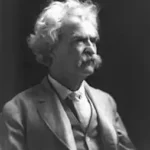 | |
My Debut as a Literary Person | |
| Author | Mark Twain |
|---|---|
| Published |
1868
|
| Language | English |
| Nationality | American |
| Genre | American Literature, Humor |
1868 Short Story
My Debut as a Literary Person
My Debut as a Literary Person is an English American Literature, Humor short story by American writer Mark Twain. It was first published in 1868.
My Debut as a Literary Person
by Mark Twain
In those early days I had already published one little thing (‘The Jumping Frog’) in an Eastern paper, but I did not consider that that counted. In my view, a person who published things in a mere newspaper could not properly claim recognition as a Literary Person: he must rise away above that; he must appear in a magazine. He would then be a Literary Person; also, he would be famous–right away. These two ambitions were strong upon me. This was in 1866. I prepared my contribution, and then looked around for the best magazine to go up to glory in. I selected the most important one in New York. The contribution was accepted. I signed it ‘Mark Twain;’ for that name had some currency on the Pacific coast, and it was my idea to spread it all over the world, now, at this one jump. The article appeared in the December number, and I sat up a month waiting for the January number; for that one would contain the year’s list of contributors, my name would be in it, and I should be famous and could give the banquet I was meditating.
I did not give the banquet. I had not written the ‘Mark Twain‘ distinctly; it was a fresh name to Eastern printers, and they put it ‘Mike Swain’ or ‘MacSwain,’ I do not remember which. At any rate, I was not celebrated and I did not give the banquet. I was a Literary Person, but that was all–a buried one; buried alive.
My article was about the burning of the clipper-ship ‘Hornet’ on the line, May 3, 1866. There were thirty-one men on board at the time, and I was in Honolulu when the fifteen lean and ghostly survivors arrived there after a voyage of forty-three days in an open boat, through the blazing tropics, on ten days’ rations of food. A very remarkable trip; but it was conducted by a captain who was a remarkable man, otherwise there would have been no survivors. He was a New Englander of the best sea-going stock of the old capable times–Captain Josiah Mitchell.
I was in the islands to write letters for the weekly edition of the Sacramento ‘Union,’ a rich and influential daily journal which hadn’t any use for them, but could afford to spend twenty dollars a week for nothing. The proprietors were lovable and well-beloved men: long ago dead, no doubt, but in me there is at least one person who still holds them in grateful remembrance; for I dearly wanted to see the islands, and they listened to me and gave me the opportunity when there was but slender likelihood that it could profit them in any way.
I had been in the islands several months when the survivors arrived. I was laid up in my room at the time, and unable to walk. Here was a great occasion to serve my journal, and I not able to take advantage of it. Necessarily I was in deep trouble. But by good luck his Excellency Anson Burlingame was there at the time, on his way to take up his post in China, where he did such good work for the United States. He came and put me on a stretcher and had me carried to the hospital where the shipwrecked men were, and I never needed to ask a question. He attended to all of that himself, and I had nothing to do but make the notes. It was like him to take that trouble. He was a great man and a great American, and it was in his fine nature to come down from his high office and do a friendly turn whenever he could.
We got through with this work at six in the evening. I took no dinner, for there was no time to spare if I would beat the other correspondents. I spent four hours arranging the notes in their proper order, then wrote all night and beyond it; with this result: that I had a very long and detailed account of the ‘Hornet’ episode ready at nine in the morning, while the other correspondents of the San Francisco journals had nothing but a brief outline report–for they didn’t sit up. The now-and-then schooner was to sail for San Francisco about nine; when I reached the dock she was free forward and was just casting off her stern-line. My fat envelope was thrown by a strong hand, and fell on board all right, and my victory was a safe thing. All in due time the ship reached San Francisco, but it was my complete report which made the stir and was telegraphed to the New York papers, by Mr. Cash; he was in charge of the Pacific bureau of the ‘New York Herald’ at the time.
When I returned to California by-and-by, I went up to Sacramento and presented a bill for general correspondence at twenty dollars a week. It was paid. Then I presented a bill for ‘special’ service on the ‘Hornet’ matter of three columns of solid nonpareil at a hundred dollars a column. The cashier didn’t faint, but he came rather near it. He sent for the proprietors, and they came and never uttered a protest. They only laughed in their jolly fashion, and said it was robbery, but no matter; it was a grand ‘scoop’ (the bill or my ‘Hornet’ report, I didn’t know which): ‘Pay it. It’s all right.’ The best men that ever owned a newspaper.
The ‘Hornet’ survivors reached the Sandwich Islands the 15th of June. They were mere skinny skeletons; their clothes hung limp about them and fitted them no better than a flag fits the flag-staff in a calm. But they were well nursed in the hospital; the people of Honolulu kept them supplied with all the dainties they could need; they gathered strength fast, and were presently nearly as good as new. Within a fortnight the most of them took ship for San Francisco; that is, if my dates have not gone astray in my memory. I went in the same ship, a sailing-vessel. Captain Mitchell of the ‘Hornet’ was along; also the only passengers the ‘Hornet’ had carried. These were two young men from Stamford, Connecticut–brothers: Samuel and Henry Ferguson. The ‘Hornet’ was a clipper of the first class and a fast sailer; the young men’s quarters were roomy and comfortable, and were well stocked with books, and also with canned meats and fruits to help out the ship-fare with; and when the ship cleared from New York harbour in the first week of January there was promise that she would make quick and pleasant work of the fourteen or fifteen thousand miles in front of her. As soon as the cold latitudes were left behind and the vessel entered summer weather, the voyage became a holiday picnic. The ship flew southward under a cloud of sail which needed no attention, no modifying or change of any kind, for days together. The young men read, strolled the ample deck, rested and drowsed in the shade of the canvas, took their meals with the captain; and when the day was done they played dummy whist with him till bed-time. After the snow and ice and tempests of the Horn, the ship bowled northward into summer weather again, and the trip was a picnic once more.
Until the early morning of the 3rd of May. Computed position of the ship 112 degrees 10 minutes longitude, latitude 2 degrees above the equator; no wind, no sea–dead calm; temperature of the atmosphere, tropical, blistering, unimaginable by one who has not been roasted in it. There was a cry of fire. An unfaithful sailor had disobeyed the rules and gone into the booby-hatch with an open light to draw some varnish from a cask. The proper result followed, and the vessel’s hours were numbered.
There was not much time to spare, but the captain made the most of it. The three boats were launched–long-boat and two quarter-boats. That the time was very short and the hurry and excitement considerable is indicated by the fact that in launching the boats a hole was stove in the side of one of them by some sort of collision, and an oar driven through the side of another. The captain’s first care was to have four sick sailors brought up and placed on deck out of harm’s way–among them a ‘Portyghee.’ This man had not done a day’s work on the voyage, but had lain in his hammock four months nursing an abscess. When we were taking notes in the Honolulu hospital and a sailor told this to Mr. Burlingame, the third mate, who was lying near, raised his head with an effort, and in a weak voice made this correction–with solemnity and feeling:
‘Raising abscesses! He had a family of them. He done it to keep from standing his watch.’
Any provisions that lay handy were gathered up by the men and two passengers and brought and dumped on the deck where the ‘Portyghee’ lay; then they ran for more. The sailor who was telling this to Mr. Burlingame added:
‘We pulled together thirty-two days’ rations for the thirty-one men that way.’
The third mate lifted his head again and made another correction–with bitterness:
‘The “Portyghee” et twenty-two of them while he was soldiering there and nobody noticing. A damned hound.’
The fire spread with great rapidity. The smoke and flame drove the men back, and they had to stop their incomplete work of fetching provisions, and take to the boats with only ten days’ rations secured.
Each boat had a compass, a quadrant, a copy of Bowditch’s ‘Navigator,’ and a Nautical Almanac, and the captain’s and chief mate’s boats had chronometers. There were thirty-one men all told. The captain took an account of stock, with the following result: four hams, nearly thirty pounds of salt pork, half-box of raisins, one hundred pounds of bread, twelve two-pound cans of oysters, clams, and assorted meats, a keg containing four pounds of butter, twelve gallons of water in a forty-gallon ‘scuttle-butt’, four one-gallon demijohns full of water, three bottles of brandy (the property of passengers), some pipes, matches, and a hundred pounds of tobacco. No medicines. Of course the whole party had to go on short rations at once.
The captain and the two passengers kept diaries. On our voyage to San Francisco we ran into a calm in the middle of the Pacific, and did not move a rod during fourteen days; this gave me a chance to copy the diaries. Samuel Ferguson’s is the fullest; I will draw upon it now. When the following paragraph was written the doomed ship was about one hundred and twenty days out from port, and all hands were putting in the lazy time about as usual, as no one was forecasting disaster.
[Diary entry] May 2. Latitude 1 degree 28 minutes N., longitude 111 degrees 38 minutes W. Another hot and sluggish day; at one time, however, the clouds promised wind, and there came a slight breeze –just enough to keep us going. The only thing to chronicle to-day is the quantities of fish about; nine bonitos were caught this forenoon, and some large albacores seen. After dinner the first mate hooked a fellow which he could not hold, so he let the line go to the captain, who was on the bow. He, holding on, brought the fish to with a jerk, and snap went the line, hook and all. We also saw astern, swimming lazily after us, an enormous shark, which must have been nine or ten feet long. We tried him with all sorts of lines and a piece of pork, but he declined to take hold. I suppose he had appeased his appetite on the heads and other remains of the bonitos we had thrown overboard.
Next day’s entry records the disaster. The three boats got away, retired to a short distance, and stopped. The two injured ones were leaking badly; some of the men were kept busy baling, others patched the holes as well as they could. The captain, the two passengers, and eleven men were in the long-boat, with a share of the provisions and water, and with no room to spare, for the boat was only twenty-one feet long, six wide, and three deep. The chief mate and eight men were in one of the small boats, the second mate and seven men in the other. The passengers had saved no clothing but what they had on, excepting their overcoats. The ship, clothed in flame and sending up a vast column of black smoke into the sky, made a grand picture in the solitudes of the sea, and hour after hour the outcasts sat and watched it. Meantime the captain ciphered on the immensity of the distance that stretched between him and the nearest available land, and then scaled the rations down to meet the emergency; half a biscuit for dinner; one biscuit and some canned meat for dinner; half a biscuit for tea; a few swallows of water for each meal. And so hunger began to gnaw while the ship was still burning.
[Diary entry] May 4. The ship burned all night very brightly, and hopes are that some ship has seen the light and is bearing down upon us. None seen, however, this forenoon, so we have determined to go together north and a little west to some islands in 18 degrees or 19 degrees north latitude and 114 degrees to 115 degrees west longitude, hoping in the meantime to be picked up by some ship. The ship sank suddenly at about 5 A.M. We find the sun very hot and scorching, but all try to keep out of it as much as we can.
They did a quite natural thing now: waited several hours for that possible ship that might have seen the light to work her slow way to them through the nearly dead calm. Then they gave it up and set about their plans. If you will look at the map you will say that their course could be easily decided. Albemarle Island (Galapagos group) lies straight eastward nearly a thousand miles; the islands referred to in the diary as ‘some islands’ (Revillagigedo Islands) lie, as they think, in some widely uncertain region northward about one thousand miles and westward one hundred or one hundred and fifty miles. Acapulco, on the Mexican coast, lies about north-east something short of one thousand miles. You will say random rocks in the ocean are not what is wanted; let them strike for Acapulco and the solid continent. That does look like the rational course, but one presently guesses from the diaries that the thing would have been wholly irrational–indeed, suicidal. If the boats struck for Albemarle they would be in the doldrums all the way; and that means a watery perdition, with winds which are wholly crazy, and blow from all points of the compass at once and also perpendicularly. If the boats tried for Acapulco they would get out of the doldrums when half-way there–in case they ever got half-way–and then they would be in lamentable case, for there they would meet the north-east trades coming down in their teeth, and these boats were so rigged that they could not sail within eight points of the wind. So they wisely started northward, with a slight slant to the west. They had but ten days’ short allowance of food; the long-boat was towing the others; they could not depend on making any sort of definite progress in the doldrums, and they had four or five hundred miles of doldrums in front of them yet. They are the real equator, a tossing, roaring, rainy belt, ten or twelve hundred miles broad, which girdles the globe.
It rained hard the first night and all got drenched, but they filled up their water-butt. The brothers were in the stern with the captain, who steered. The quarters were cramped; no one got much sleep. ‘Kept on our course till squalls headed us off.’
Stormy and squally the next morning, with drenching rains. A heavy and dangerous ‘cobbling’ sea. One marvels how such boats could live in it. Is it called a feat of desperate daring when one man and a dog cross the Atlantic in a boat the size of a long-boat, and indeed it is; but this long-boat was overloaded with men and other plunder, and was only three feet deep. ‘We naturally thought often of all at home, and were glad to remember that it was Sacrament Sunday, and that prayers would go up from our friends for us, although they know not our peril.’
The captain got not even a cat-nap during the first three days and nights, but he got a few winks of sleep the fourth night. ‘The worst sea yet.’ About ten at night the captain changed his course and headed east-north-east, hoping to make Clipperton Rock. If he failed, no matter; he would be in a better position to make those other islands. I will mention here that he did not find that rock.
On May 8 no wind all day; sun blistering hot; they take to the oars. Plenty of dolphins, but they couldn’t catch any. ‘I think we are all beginning to realise more and more the awful situation we are in.’ ‘It often takes a ship a week to get through the doldrums; how much longer, then, such a craft as ours?’ ‘We are so crowded that we cannot stretch ourselves out for a good sleep, but have to take it any way we can get it.’
Of course this feature will grow more and more trying, but it will be human nature to cease to set it down; there will be five weeks of it yet –we must try to remember that for the diarist; it will make our beds the softer.
May 9 the sun gives him a warning: ‘Looking with both eyes, the horizon crossed thus +.’ ‘Henry keeps well, but broods over our troubles more than I wish he did.’ They caught two dolphins; they tasted well. ‘The captain believed the compass out of the way, but the long-invisible north star came out–a welcome sight–and endorsed the compass.’
May 10, ‘latitude 7 degrees 0 minutes 3 seconds N., longitude 111 degrees 32 minutes W.’ So they have made about three hundred miles of northing in the six days since they left the region of the lost ship. ‘Drifting in calms all day.’ And baking hot, of course; I have been down there, and I remember that detail. ‘Even as the captain says, all romance has long since vanished, and I think the most of us are beginning to look the fact of our awful situation full in the face.’ ‘We are making but little headway on our course.’ Bad news from the rearmost boat: the men are improvident; ‘they have eaten up all of the canned meats brought from the ship, and are now growing discontented.’ Not so with the chief mate’s people–they are evidently under the eye of a man.
Under date of May 11: ‘Standing still! or worse; we lost more last night than we made yesterday.’ In fact, they have lost three miles of the three hundred of northing they had so laboriously made. ‘The cock that was rescued and pitched into the boat while the ship was on fire still lives, and crows with the breaking of dawn, cheering us a good deal.’ What has he been living on for a week? Did the starving men feed him from their dire poverty? ‘The second mate’s boat out of water again, showing that they over-drink their allowance. The captain spoke pretty sharply to them.’ It is true: I have the remark in my old note-book; I got it of the third mate in the hospital at Honolulu. But there is not room for it here, and it is too combustible, anyway. Besides, the third mate admired it, and what he admired he was likely to enhance.
They were still watching hopefully for ships. The captain was a thoughtful man, and probably did not disclose on them that that was substantially a waste of time. ‘In this latitude the horizon is filled with little upright clouds that look very much like ships.’ Mr. Ferguson saved three bottles of brandy from his private stores when he left the ship, and the liquor came good in these days. ‘The captain serves out two tablespoonfuls of brandy and water–half and half–to our crew.’ He means the watch that is on duty; they stood regular watches–four hours on and four off. The chief mate was an excellent officer–a self-possessed, resolute, fine, all-round man. The diarist makes the following note–there is character in it: ‘I offered one bottle of brandy to the chief mate, but he declined, saying he could keep the after-boat quiet, and we had not enough for all.’
HENRY FERGUSON’S DIARY TO DATE, GIVEN IN FULL:
May 4, 5, 6, doldrums. May 7, 8, 9, doldrums. May 10, 11, 12, doldrums. Tells it all. Never saw, never felt, never heard, never experienced such heat, such darkness, such lightning and thunder, and wind and rain, in my life before.
That boy’s diary is of the economical sort that a person might properly be expected to keep in such circumstances–and be forgiven for the economy, too. His brother, perishing of consumption, hunger, thirst, blazing heat, drowning rains, loss of sleep, lack of exercise, was persistently faithful and circumstantial with his diary from the first day to the last–an instance of noteworthy fidelity and resolution. In spite of the tossing and plunging boat he wrote it close and fine, in a hand as easy to read as print. They can’t seem to get north of 7 degrees N.; they are still there the next day:
[Diary entry] May 12. A good rain last night, and we caught a good deal, though not enough to fill up our tank, pails, &c. Our object is to get out of these doldrums, but it seems as if we cannot do it. To-day we have had it very variable, and hope we are on the northern edge, thought we are not much above 7 degrees. This morning we all thought we had made out a sail; but it was one of those deceiving clouds. Rained a good deal to-day, making all hands wet and uncomfortable; we filled up pretty nearly all our water-pots, however. I hope we may have a fine night, for the captain certainly wants rest, and while there is any danger of squalls, or danger of any kind, he is always on hand. I never would have believed that open boats such as ours, with their loads, could live in some of the seas we have had.
During the night, 12th-13th, ‘the cry of a ship! brought us to our feet.’ It seemed to be the glimmer of a vessel’s signal-lantern rising out of the curve of the sea. There was a season of breathless hope while they stood watching, with their hands shading their eyes, and their hearts in their throats; then the promise failed: the light was a rising star. It is a long time ago–thirty-two years–and it doesn’t matter now, yet one is sorry for their disappointment. ‘Thought often of those at home to-day, and of the disappointment they will feel next Sunday at not hearing from us by telegraph from San Francisco.’ It will be many weeks yet before the telegram is received, and it will come as a thunderclap of joy then, and with the seeming of a miracle, for it will raise from the grave men mourned as dead. ‘To-day our rations were reduced to a quarter of a biscuit a meal, with about half a pint of water.’ This is on May 13, with more than a month of voyaging in front of them yet! However, as they do not know that, ‘we are all feeling pretty cheerful.’
In the afternoon of the 14th there was a thunderstorm, ‘which toward night seemed to close in around us on every side, making it very dark and squally.’ ‘Our situation is becoming more and more desperate,’ for they were making very little northing ‘and every day diminishes our small stock of provisions.’ They realise that the boats must soon separate, and each fight for its own life. Towing the quarter-boats is a hindering business.
That night and next day, light and baffling winds and but little progress. Hard to bear, that persistent standing still, and the food wasting away. ‘Everything in a perfect sop; and all so cramped, and no change of clothes.’ Soon the sun comes out and roasts them. ‘Joe caught another dolphin to-day; in his maw we found a flying-fish and two skipjacks.’ There is an event, now, which rouses an enthusiasm of hope: a land-bird arrives! It rests on the yard for awhile, and they can look at it all they like, and envy it, and thank it for its message. As a subject of talk it is beyond price–a fresh new topic for tongues tired to death of talking upon a single theme: Shall we ever see the land again; and when? Is the bird from Clipperton Rock? They hope so; and they take heart of grace to believe so. As it turned out the bird had no message; it merely came to mock.
May 16, ‘the cock still lives, and daily carols forth his praise.’ It will be a rainy night, ‘but I do not care if we can fill up our water-butts.’
On the 17th one of those majestic spectres of the deep, a water-spout, stalked by them, and they trembled for their lives. Young Henry set it down in his scanty journal with the judicious comment that ‘it might have been a fine sight from a ship.’
From Captain Mitchell’s log for this day: ‘Only half a bushel of bread-crumbs left.’ (And a month to wander the seas yet.’)
It rained all night and all day; everybody uncomfortable. Now came a sword-fish chasing a bonito; and the poor thing, seeking help and friends, took refuge under the rudder. The big sword-fish kept hovering around, scaring everybody badly. The men’s mouths watered for him, for he would have made a whole banquet; but no one dared to touch him, of course, for he would sink a boat promptly if molested. Providence protected the poor bonito from the cruel sword-fish. This was just and right. Providence next befriended the shipwrecked sailors: they got the bonito. This was also just and right. But in the distribution of mercies the sword-fish himself got overlooked. He now went away; to muse over these subtleties, probably. The men in all the boats seem pretty well; the feeblest of the sick ones (not able for a long time to stand his watch on board the ship) ‘is wonderfully recovered.’ This is the third mate’s detected ‘Portyghee’ that raised the family of abscesses.
Passed a most awful night. Rained hard nearly all the time, and blew in squalls, accompanied by terrific thunder and lightning from all points of the compass.–Henry’s Log.
Most awful night I ever witnessed.–Captain’s Log.
Latitude, May 18, 11 degrees 11 minutes. So they have averaged but forty miles of northing a day during the fortnight. Further talk of separating. ‘Too bad, but it must be done for the safety of the whole.’ ‘At first I never dreamed, but now hardly shut my eyes for a cat-nap without conjuring up something or other–to be accounted for by weakness, I suppose.’ But for their disaster they think they would be arriving in San Francisco about this time. ‘I should have liked to send B—the telegram for her birthday.’ This was a young sister.
On the 19th the captain called up the quarter-boats and said one would have to go off on its own hook. The long-boat could no longer tow both of them. The second mate refused to go, but the chief mate was ready; in fact, he was always ready when there was a man’s work to the fore. He took the second mate’s boat; six of its crew elected to remain, and two of his own crew came with him (nine in the boat, now, including himself). He sailed away, and toward sunset passed out of sight. The diarist was sorry to see him go. It was natural; one could have better spared the ‘Portyghee.’ After thirty-two years I find my prejudice against this ‘Portyghee’ reviving. His very looks have long passed out of my memory; but no matter, I am coming to hate him as religiously as ever. ‘Water will now be a scarce article, for as we get out of the doldrums we shall get showers only now and then in the trades. This life is telling severely on my strength. Henry holds out first-rate.’ Henry did not start well, but under hardships he improved straight along.
Latitude, Sunday, May 20, 12 degrees 0 minutes 9 seconds. They ought to be well out of the doldrums now, but they are not. No breeze–the longed-for trades still missing. They are still anxiously watching for a sail, but they have only ‘visions of ships that come to naught–the shadow without the substance.’ The second mate catches a booby this afternoon, a bird which consists mainly of feathers; ‘but as they have no other meat, it will go well.’
May 21, they strike the trades at last! The second mate catches three more boobies, and gives the long-boat one. Dinner ‘half a can of mincemeat divided up and served around, which strengthened us somewhat.’ They have to keep a man bailing all the time; the hole knocked in the boat when she was launched from the burning ship was never efficiently mended. ‘Heading about north-west now.’ They hope they have easting enough to make some of these indefinite isles. Failing that, they think they will be in a better position to be picked up. It was an infinitely slender chance, but the captain probably refrained from mentioning that.
The next day is to be an eventful one.
[Diary entry] May 22. Last night wind headed us off, so that part of the time we had to steer east-south-east and then west-north-west, and so on. This morning we were all startled by a cry of ‘SAIL HO!’ Sure enough, we could see it! And for a time we cut adrift from the second mate’s boat, and steered so as to attract its attention. This was about half-past five A.M. After sailing in a state of high excitement for almost twenty minutes we made it out to be the chief mate’s boat. Of course we were glad to see them and have them report all well; but still it was a bitter disappointment to us all. Now that we are in the trades it seems impossible to make northing enough to strike the isles. We have determined to do the best we can, and get in the route of vessels. Such being the determination, it became necessary to cast off the other boat, which, after a good deal of unpleasantness, was done, we again dividing water and stores, and taking Cox into our boat. This makes our number fifteen. The second mate’s crew wanted to all get in with us, and cast the other boat adrift. It was a very painful separation.
So these isles that they have struggled for so long and so hopefully have to be given up. What with lying birds that come to mock, and isles that are but a dream, and ‘visions of ships that come to naught,’ it is a pathetic time they are having, with much heartbreak in it. It was odd that the vanished boat, three days lost to sight in that vast solitude, should appear again. But it brought Cox–we can’t be certain why. But if it hadn’t, the diarist would never have seen the land again.
[Diary entry] Our chances as we go west increase in regard to being picked up, but each day our scanty fare is so much reduced. Without the fish, turtle, and birds sent us, I do not know how we should have got along. The other day I offered to read prayers morning and evening for the captain, and last night commenced. The men, although of various nationalities and religions, are very attentive, and always uncovered. May God grant my weak endeavour its issue!
Latitude, May 24, 14 degrees 18 minutes N. Five oysters apiece for dinner and three spoonfuls of juice, a gill of water, and a piece of biscuit the size of a silver dollar. ‘We are plainly getting weaker–God have mercy upon us all!’ That night heavy seas break over the weather side and make everybody wet and uncomfortable besides requiring constant baling.
Next day ‘nothing particular happened.’ Perhaps some of us would have regarded it differently. ‘Passed a spar, but not near enough to see what it was.’ They saw some whales blow; there were flying-fish skimming the seas, but none came aboard. Misty weather, with fine rain, very penetrating.
Latitude, May 26, 15 degrees 50 minutes. They caught a flying-fish and a booby, but had to eat them raw. ‘The men grow weaker, and, I think, despondent; they say very little, though.’ And so, to all the other imaginable and unimaginable horrors, silence is added–the muteness and brooding of coming despair. ‘It seems our best chance to get in the track of ships with the hope that some one will run near enough to our speck to see it.’ He hopes the other boards stood west and have been picked up. (They will never be heard of again in this world.)
[Diary entry] Sunday, May 27, Latitude 16 degrees 0 minutes 5 seconds; longitude, by chronometer, 117 degrees 22 minutes. Our fourth Sunday! When we left the ship we reckoned on having about ten days’ supplies, and now we hope to be able, by rigid economy, to make them last another week if possible.[1] Last night the sea was comparatively quiet, but the wind headed us off to about west-north-west, which has been about our course all day to-day. Another flying-fish came aboard last night, and one more to-day –both small ones. No birds. A booby is a great catch, and a good large one makes a small dinner for the fifteen of us–that is, of course, as dinners go in the ‘Hornet’s’ long-boat. Tried this morning to read the full service to myself, with the Communion, but found it too much; am too weak, and get sleepy, and cannot give strict attention; so I put off half till this afternoon. I trust God will hear the prayers gone up for us at home to-day, and graciously answer them by sending us succour and help in this our season of deep distress.
The next day was ‘a good day for seeing a ship.’ But none w







